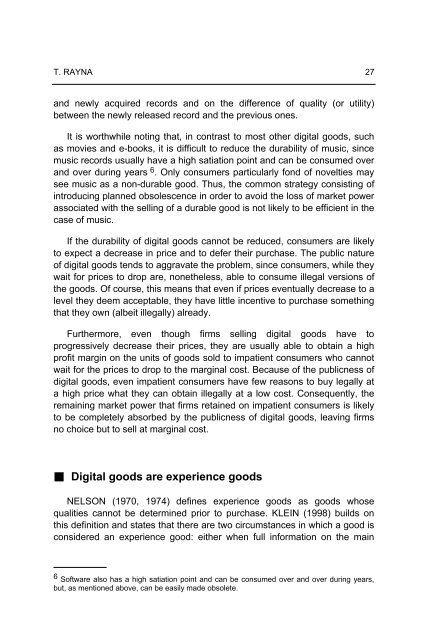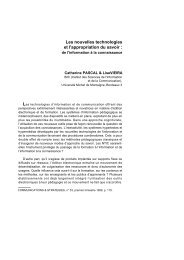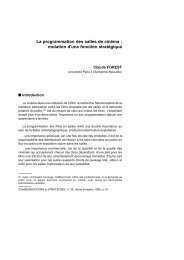The Nature of Digital Goods - Idate
The Nature of Digital Goods - Idate
The Nature of Digital Goods - Idate
You also want an ePaper? Increase the reach of your titles
YUMPU automatically turns print PDFs into web optimized ePapers that Google loves.
T. RAYNA 27<br />
and newly acquired records and on the difference <strong>of</strong> quality (or utility)<br />
between the newly released record and the previous ones.<br />
It is worthwhile noting that, in contrast to most other digital goods, such<br />
as movies and e-books, it is difficult to reduce the durability <strong>of</strong> music, since<br />
music records usually have a high satiation point and can be consumed over<br />
and over during years 6 . Only consumers particularly fond <strong>of</strong> novelties may<br />
see music as a non-durable good. Thus, the common strategy consisting <strong>of</strong><br />
introducing planned obsolescence in order to avoid the loss <strong>of</strong> market power<br />
associated with the selling <strong>of</strong> a durable good is not likely to be efficient in the<br />
case <strong>of</strong> music.<br />
If the durability <strong>of</strong> digital goods cannot be reduced, consumers are likely<br />
to expect a decrease in price and to defer their purchase. <strong>The</strong> public nature<br />
<strong>of</strong> digital goods tends to aggravate the problem, since consumers, while they<br />
wait for prices to drop are, nonetheless, able to consume illegal versions <strong>of</strong><br />
the goods. Of course, this means that even if prices eventually decrease to a<br />
level they deem acceptable, they have little incentive to purchase something<br />
that they own (albeit illegally) already.<br />
Furthermore, even though firms selling digital goods have to<br />
progressively decrease their prices, they are usually able to obtain a high<br />
pr<strong>of</strong>it margin on the units <strong>of</strong> goods sold to impatient consumers who cannot<br />
wait for the prices to drop to the marginal cost. Because <strong>of</strong> the publicness <strong>of</strong><br />
digital goods, even impatient consumers have few reasons to buy legally at<br />
a high price what they can obtain illegally at a low cost. Consequently, the<br />
remaining market power that firms retained on impatient consumers is likely<br />
to be completely absorbed by the publicness <strong>of</strong> digital goods, leaving firms<br />
no choice but to sell at marginal cost.<br />
<strong>Digital</strong> goods are experience goods<br />
NELSON (1970, 1974) defines experience goods as goods whose<br />
qualities cannot be determined prior to purchase. KLEIN (1998) builds on<br />
this definition and states that there are two circumstances in which a good is<br />
considered an experience good: either when full information on the main<br />
6 S<strong>of</strong>tware also has a high satiation point and can be consumed over and over during years,<br />
but, as mentioned above, can be easily made obsolete.





